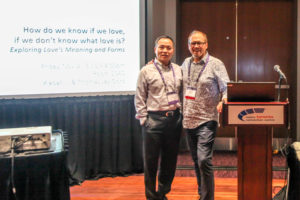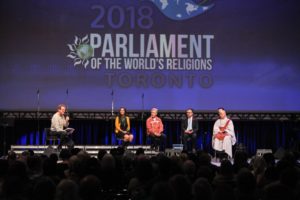The World’s Religions
The 2018 Parliament of the World’s Religions in Toronto was a positive experience for me!
I spent much of my time working with the Institute for Ecological Civilization (EcoCiv), for which I am a senior partner. The Institute organized a major track exploring issues of religion and justice.
My colleagues and I worked for more than a year recruiting and administrating a host of speakers and panels. Perhaps the most effort went into developing a 3-hour plenary assembly. I’m happy to say all of this work was a great success!
I could say much about my Parliament experience. But I’ll briefly mention five highlights for me:
- I was proud to be part of the team that constructed and implemented the plenary assembly on justice. Philip Clayton, the President of EcoCiv, hosted the three-hour event.
 The assembly featured activists from Africa, South America, Asia, and North America, artists, and faith leaders. John Cobb concluded the session by encouraging the audience to imagine a future in which ecology was our civilization’s guiding motif.
The assembly featured activists from Africa, South America, Asia, and North America, artists, and faith leaders. John Cobb concluded the session by encouraging the audience to imagine a future in which ecology was our civilization’s guiding motif. - I gave a presentation on the meaning of love. Xiaoan Li of the Fetzer Institute offered a response. I felt good about my lecture, although it was quite brief. The audience responded well to it.
 I felt even better about the friendship I developed with Xiaoan. I look forward to working with him on future projects.
I felt even better about the friendship I developed with Xiaoan. I look forward to working with him on future projects. - The themes of ecological civilization were well articulated in several justice track sessions. Among the speakers who articulated those themes well were Isabella Alexander, John Cobb, Ken Kitatani, David Korten, Josh Kureethadam, Ron Phipps, Andrew Schwartz, Vandana Shiva, and Mary Evelyn Tucker. More needs to be done to explain why and how changes must be made to avoid catastrophes and establish a loving world.
- Alexis Waggoner moderated a discussion between Jihad Turk, Shai Held, and me. We talked about love and justice from Muslim, Jewish, and Christian perspectives. The insights that emerged were thrilling! I was especially grateful for the exchange between Shai and Jihad on the state of the Israel-Palestine conflicts.
- Finally, it’s such a joy to renew long-time friendships and establish new ones. I saw former students in action as speakers, which was so cool. I ran into friends whom I’d not seen in person for years. And I made new friendships I hope will deepen in the future. Although I’m a big fan of technology and social media that links me to others, there’s something powerful about being together in person!
After the Parliament, a few friends who did not attend asked me what had been “decided” in Toronto. To many people, the word “parliament” suggests a decision-making body with the power to implement those decisions. My friends wanted to hear what consensus had been reached.
The Parliament of the World’s Religions doesn’t take votes or make binding decisions. It’s more about people offering ideas, sharing wisdom, learning about traditions, and exploring interfaith issues. It’s a “come one, come all” gathering not an elected congress.
Of course, it would be good if people left the meeting determined to be more loving and to care for each other and the planet. I suspect some walked away with such determination. I know I did. And that’s something worth celebrating!

Comments
I think that you are a great thinker with a global idea. Your idea, as in your books, is love for God.
I am very happy as a Shia Muslim if I can do something to advance this theory.
Now with Professor Culp, we are developing a theme called Panentheism and Unity of Existence.
How can I send you a message?
Part of the resources we used in this book was The Uncontrolling Love of God: An Open and Relational Account of Providence and The Second Was God Can not !: How to Believe in God and Love after Tragedy, Abuse, or Other Suffering
My Email: [email protected]
Sincerely Yours
Seyyed Mohammad Mehdi